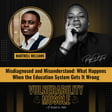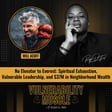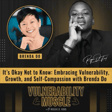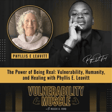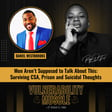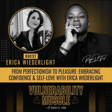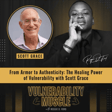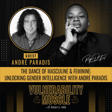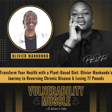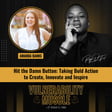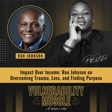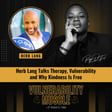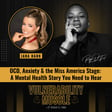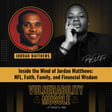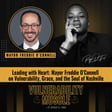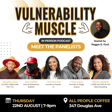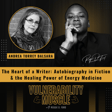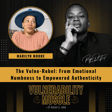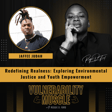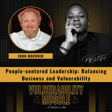
026 - Unlocking Holistic Wellness: Conquering Emotional Eating with Tina Huynh
In this episode of Vulnerability Muscle, host Reggie D. Ford engages in a profound conversation with nutrition expert Tina Huynh, who shares her journey from battling an eating disorder to becoming a holistic wellness advocate. They discuss the importance of balanced nutrition, mindful eating, and the connection between gut health and mental well-being, while also addressing deeper issues like self-worth and societal pressures. Tina emphasizes the role of community in healing and the power of vulnerability and self-awareness in overcoming isolation and emotional eating, offering listeners practical tips and heartfelt encouragement.
Highlights:
⭐️ Tina discusses her work with women who struggle with nutrition, simplifying the overwhelming information available online to help them focus on what's truly important. She emphasizes building habits and consistency for long-term impact, transforming lifestyles rather than quick fixes.
⭐️ Tina highlights the complexities of navigating nutrition in a world filled with conflicting information.
⭐️ Drawing on her background in psychology, Tina discusses the intricate relationship between gut health and mental well-being.
⭐️ Rather than focusing on foods to avoid, Tina advocates for an additive approach, emphasizing the importance of adding nourishing foods to one's diet.
⭐️ Tina addresses popular misconceptions about seed oils, oatmeal, oat milk, fruit juice, and artificial sweeteners, offering insights into making informed dietary choices.
⭐️ Tina opens up about her personal struggles with eating disorders, discussing the role of ADHD in women and societal influences on self-worth.
⭐️ Tina shares words of encouragement for individuals struggling with self-image, emphasizing the importance of embracing one's uniqueness and practicing self-compassion.
⭐️ Tina offers practical tips for simplifying meal prep and making healthier food choices, encouraging listeners to prioritize convenience and accessibility without guilt.
⭐️ Reggie and Tina discuss the relationship between actions and fears, acknowledging the tendency to isolate oneself during challenging times.
⭐️ Tina shares her gratitude for the power of vulnerability and its role in preserving human connection and empathy.
📲 Connect with Reggie:
Instagram - https://instagram.com/reggiedford
Facebook - https://facebook.com/reggiedford
LinkedIn - https://linkedin.com/in/reggiedford
Twitter - https://twitter.com/reggiedford
YouTube - https://youtube.com/@reggiedford
Website - https://reggiedford.com
Book - https://amzn.to/487OqJD
Podcast - https://reggiedford.com/vulnerabilitymuscle
Podcast’s Instagram - https://instagram.com/vulnerabilitymuscle
📲 Connect with Tina:
Website - https://www.tinasarena.com/
IG - @tinas_arena_
LinkedIn - https://www.linkedin.com/in/tinakhuynh/
⚠️ DISCLAIMER: The content is for informational and educational purposes only. It is not intended to be a substitute for professional advice, diagnosis, or treatment. Always seek the advice of your mental health professional or other qualified health provider with any questions you may have regarding your condition. Never disregard professional advice or delay in seeking it because of something you have heard or read in this content!
